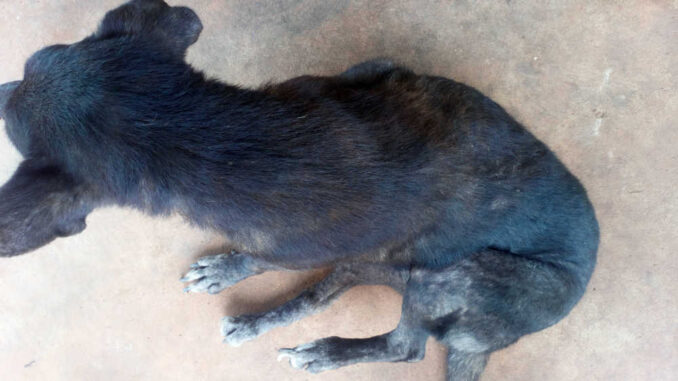
The dog’s skin is a dynamic and sometimes bewildering organ. It serves so many important functions, yet can come up with so many similar yet totally different skin problems and ailments. As a veterinarian, I see skin issues on a near daily basis. One of those skin issues is the combination of hair loss and black spots on skin showing up on a dog at the same time. In this article, we will discuss what could be causing those symptoms and what you can do to help your dog.
Top Causes of Hair Loss and Black Spots on Dog’s Skin
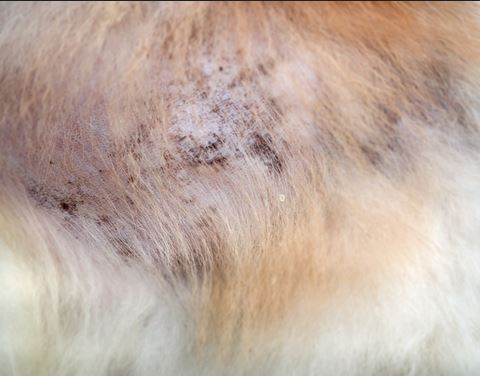
Hair loss and black spots on a dog’s skin can often go hand-in-hand. That’s because both can be caused by inflammation or irritation to the skin. You see, both of these can cause the hair to break or fall out and cause increased melanin accumulation, which is the black pigment in skin. So, what are some causes of inflammation or irritation in the skin that can lead to hair loss and black spots?
1. Allergies
Environmental or food allergies can both lead to inflammation of the skin. This causes redness and itchiness. It’s this itchiness that usually causes the hair to fall out as excessive scratching and licking can be pretty traumatic for both hair and skin, leading to hair loss and black spots. Hair loss may be all over or located in specific regions, such as above the tail or the lighter-haired parts of the body. You may also see chronic ear infections, even red eyes, and a runny nose. Allergies are very common in dogs and are often hard to treat, especially at home.
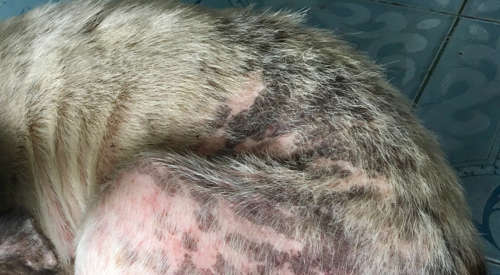
Your vet will want to see your dog to try to determine what they are allergic to. There is some allergy testing available as well. Treatment will consist of removing the allergen, if possible, and giving topical or oral antihistamines and anti-inflammatories.
2. Skin Infection/Infestation
What can be more irritating than an infection or parasitic infestation? Infections by bacteria and yeast or infestations by mites or fleas can all lead to hair loss and black spots on the skin. Skin infections are usually secondary to another underlying condition, such as allergies or a hormonal imbalance, but are quite common. Dogs will have itchy skin, possibly a rash, a foul odor, and you may see bits of flea dirt.
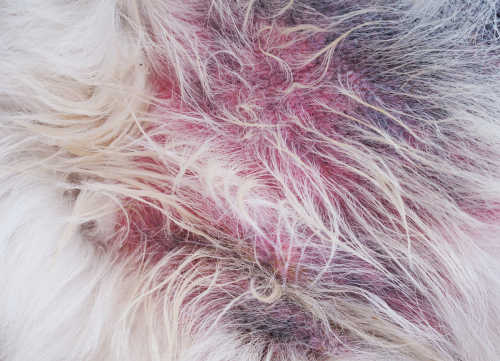
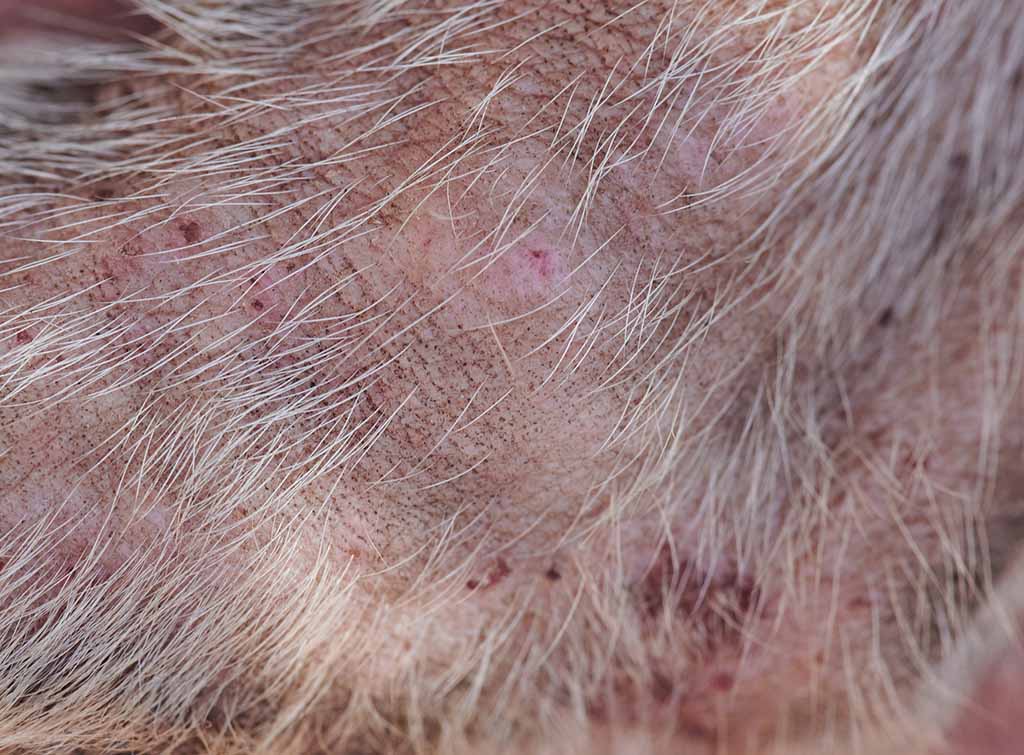
Keeping your pup up-to-date on a prescription flea and tick treatment will help prevent this issue. Otherwise, a veterinary diagnosis is key to the proper treatment. This may include antibiotics, anti-inflammatories, antifungals, or flea mediations.
3. Hormonal/Endocrine Imbalances
Hypothyroidism and Cushing’s disease are two fairly common issues that plague our dogs. These diseases create an imbalance in important hormones that the body needs for daily functions. There are many signs associated with either disease, but one that you may see is hair loss, especially over a dog’s sides, and black spots on the skin.

Hormonal imbalances require a veterinary diagnosis and lifelong treatment using either medications that supplement the hormone or that block excess from being produced. Not only do these require lifelong treatment, they also require lifelong monitoring and medication adjustment.
4. Alopecia X
This is a cause of hair loss and black spots that isn’t inflammatory. Instead, due to a genetic predisposition, dogs of some breeds develop hair loss and blackened skin with no other issues. Pomeranians, Chow Chows, Samoyeds and miniature Poodles are most commonly affected and will show up as otherwise healthy. It isn’t known what causes Alopecia X, but it’s good to know that it doesn’t pose any health risks for a pup.
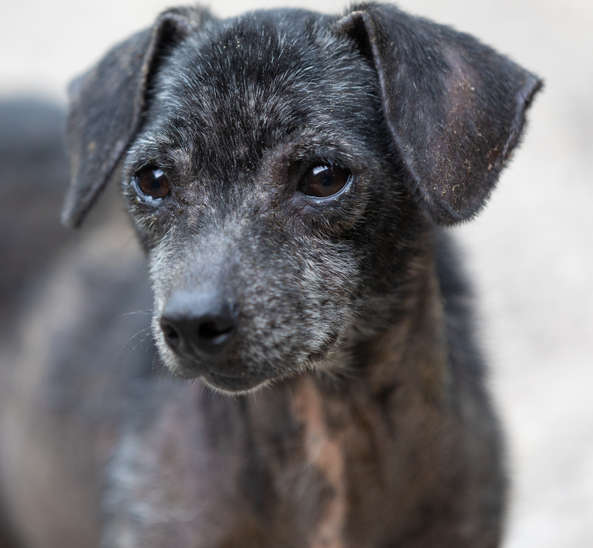
Treatment may consist of finding an underlying issue, if any, and treating that. Otherwise, hair growth may be stimulated using medicated shampoos or melatonin. Just remember, this is a cosmetic issue, so treatment might not be necessary. Just remember to apply sunscreen or a jacket to prevent sunburn.
5. Other cause
Some types of cancer and foreign bodies can cause hair loss and black spots on a dog’s skin as well. Melanoma is a quick spreading, fatal type of cancer that can show up as black spots or lumps. The hair can fall out as well. Lymphoma is another form of cancer that can lead to hair loss. Foreign bodies, such as thistle stickers or grass awns, can create an inflammatory reaction that causes hair to fall and the skin to blacken. This is why isn’t important to have any changes in your dog’s skin looked at by a veterinarian as soon as possible.
Treatment would include removal of the tumor or foreign body. Antibiotics or chemotherapy as needed.
What to Do When You See Hair Loss or Black Spots on Your Dog
We can’t stress this enough: any changes in your dog’s skin should be seen by a veterinarian as soon as possible. However, seeing a vet this very instant isn’t always feasible, so make an appointment, but until it’s time to go try these things:
- Take a picture of the area. Try to measure the spots and area of hair loss so that you can determine if it’s getting bigger or spreading. It will also help you decide if the spots are changing or growing.
- If you suspect an allergy, try to determine what to. If seasonal, suspect environmental issues. If you just changed dog foods, make a list of the ingredients.
- For extreme itchiness, you can try using an anti-inflammatory product. I recommend Vetricyn Plus Hot Spot Spray to help relieve itchiness and prevent further damage. Speak to your veterinarian before trying anything at-home with your pup to make sure there are no contraindications.
- You can also try bathing your pup with a soothing shampoo. I recommend Burt’s Bees to my clients in order to hydrate the skin and remove any irritants or allergens.
- Consider using an e-collar. If you happen to have an e-collar around, use it to prevent further licking and chewing.
When to Visit The Vet for Hair Loss and Black Spots on Dog’s Skin
Let’s just start by saying you should see your vet anytime there is any changes in your dog’s skin, hair loss, black spots, or otherwise. Whether or not it’s an emergency will depend on how your dog is feeling. If they are extremely uncomfortable and unable to eat or sleep, see your vet sooner rather than later.
- If the spots are growing or changing rapidly, see your vet immediately.
- If your dog isn’t feeling well, such as not eating, vomiting, diarrhea, weight loss, or lethargy, see your vet soon.
If your dog is feeling normal on all other fronts, schedule the next available vet appointment and monitor the hair loss and spots as discussed in the previous section.
Veterinary Diagnosis of Hair Loss and Black Spots
After a thorough exam and history that includes when the hair loss started, if it’s gotten worse, and how your dog is feeling otherwise, your vet may decide to run some tests. This may include blood work, skin scrapings or a skin biopsy. If allergies are suspected, allergy testing may be done as well. From there treatment will be decided.
Costs of Veterinary Care for Hair Loss and Black Spots
An exam without any further testing will likely run you $50-$100. If you get into skin scrapings or biopsies, that cost increases to $100-$300 +/- outside lab fees. Dogs with cancer may require surgery and chemotherapy that may cost $1,000-$3,000.
The cost for treating hormonal imbalances can cost $10-$200 per month for medications and monitoring depending on how big your dog is and how well they respond to treatment. Cost to treat allergies can cost $10-$50 per month for antihistamines or supplements to help relieve itchiness.
Would a Vet be Able to Help Over a Video Call?
Telemedicine definitely has its place in veterinary care. However, for issues related to the skin, it may be best to schedule an in-person visit. While you may choose a video call as an initial step in diagnosis, your vet is more than likely going to need to take samples and run further tests. A video call may be a good way of determining if your dog’s condition is an emergency or if you have some time to wait before getting an in-person appointment.
Frequently Asked Questions
How long does it take hair to grow back in dogs?
The amount of time it takes for hair to grow back depends on the dog and what caused the hair loss in the first place. If you’re able to get the underlying cause under control, most hair will grow back, or at least have a good start, in four to six weeks. However, some dogs take a little longer, especially if you can’t completely manage the underlying condition or if they have other health conditions going on.
Are black spots on a dog’s skin always a cause for concern?
Black spots on a dog’s skin don’t always mean bad things. Sometimes they can be a normal process of aging or sun exposure. However, if you are just noticing black spots that are rapidly growing or changing, or if your dog is showing any signs of itchiness, discomfort, or illness, see your vet.
Is hair loss in dogs breed-specific?
Some causes of hair loss in dogs are related to specific breeds. Those include Alopecia X and other hereditary alopecia. If you notice any hair loss in your dog, no matter what the breed, see your veterinarian.
Disclaimer: This website's content is not a substitute for veterinary care. Always consult with your veterinarian for healthcare decisions. Read More.


Be the first to comment